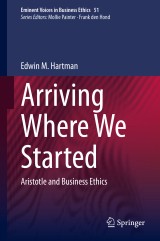Details

Arriving Where We Started
Aristotle and Business EthicsIssues in Business Ethics, Band 51
|
53,49 € |
|
| Verlag: | Springer |
| Format: | |
| Veröffentl.: | 22.10.2020 |
| ISBN/EAN: | 9783030440893 |
| Sprache: | englisch |
Dieses eBook enthält ein Wasserzeichen.
Beschreibungen
<p>Edwin Hartman offers an account of his intellectual journey from Aristotle to organization theory to business ethics to an Aristotelian approach to business ethics. Aristotle’s work in metaphysics and psychology offers some insights into the explanation of behavior. Central to this sort of explanation is characteristically human rationality. Central to successful organizations is characteristically human sociability. That human beings are by nature rational and sociable is the basis of Aristotle’s ethics. Though a modern organization is not a polis in Aristotle’s sense, it has good reason to treat people as rational and sociable on the whole, and thereby to preserve the organization as a commons of people linked by something much like Aristotle’s account of strong friendship. Organizations that are successful in this respect, particularly those that deal with a nationally diverse workforce, may offer a far-reaching and attractive model.<br></p>
<p>Introduction.- Chapter 1. Making Sense of the World: Substances.- Chapter 2. Moral Imagination.- Chapter 3. Intention, Rationality, and Irrationality.- Chapter 4. Free Will.- Chapter 5. Community and Commons.- Chapter 6: The Status of Business Ethics.- Chapter 7: Ethics Across Boundaries.<br></p><p></p>
<p><b>Edwin Hartman </b>has undergraduate degrees from Haverford College and Oxford University, a Ph.D. from Princeton University, and an MBA from the Wharton School. He has taught philosophy, management, and business ethics at the University Pennsylvania, Rutgers University, and New York University. He was a consultant in strategic management with Hay Associates. He has authored many articles and four books: <i>Substance, Body, and Soul: Aristotelian Investigations </i>(Princeton, 1977), <i>Conceptual Foundations of Organization Theory </i>(HarperCollins, 1988), <i>Organizational Ethics and the Good Life </i>(Oxford, 1995), and <i>Virtue in Business: Conversations with Aristotle </i>(Cambridge,2012). In 2014 the Society for Business Ethics gave him its Lifetime Achievement Award for scholarship in business ethics. </p>
Edwin Hartman offers an account of his intellectual journey from Aristotle to organization theory to business ethics to an Aristotelian approach to business ethics. Aristotle’s work in metaphysics and psychology offers some insights into the explanation of behavior. Central to this sort of explanation is characteristically human rationality. Central to successful organizations is characteristically human sociability. That human beings are by nature rational and sociable is the basis of Aristotle’s ethics. Though a modern organization is not a polis in Aristotle’s sense, it has good reason to treat people as rational and sociable on the whole, and thereby to preserve the organization as a commons of people linked by something much like Aristotle’s account of strong friendship. Organizations that are successful in this respect, particularly those that deal with a nationally diverse workforce, may offer a far-reaching and attractive model.<br>
Chronicles Hartman’s intellectual development from Aristotle to organization theory to business ethics Presents the author’s development of thought as a coherent process Proves that much of Aristotle’s work can be applied to modern-day business ethics
-
-
© 2024 media control GmbH
Alle Preise enthalten die gesetzliche Mehrwertsteuer. - AGB
- Impressum
- Datenschutzerklärung
- Kontakt
- FAQ
- Mein Konto
- Home
- Erweiterte Suche
- Widerrufsrecht
- Reader-Software
- Desktop-Ansicht
- Gutschein-Code einlösen


